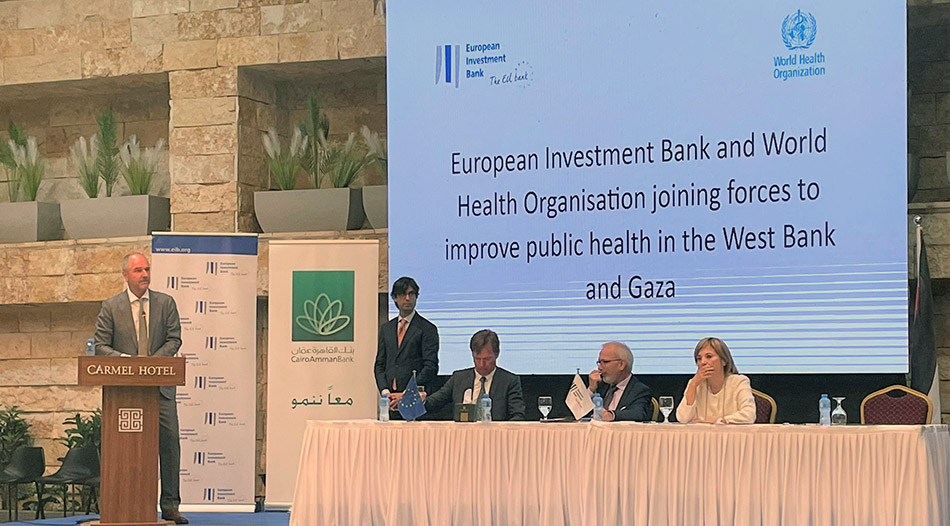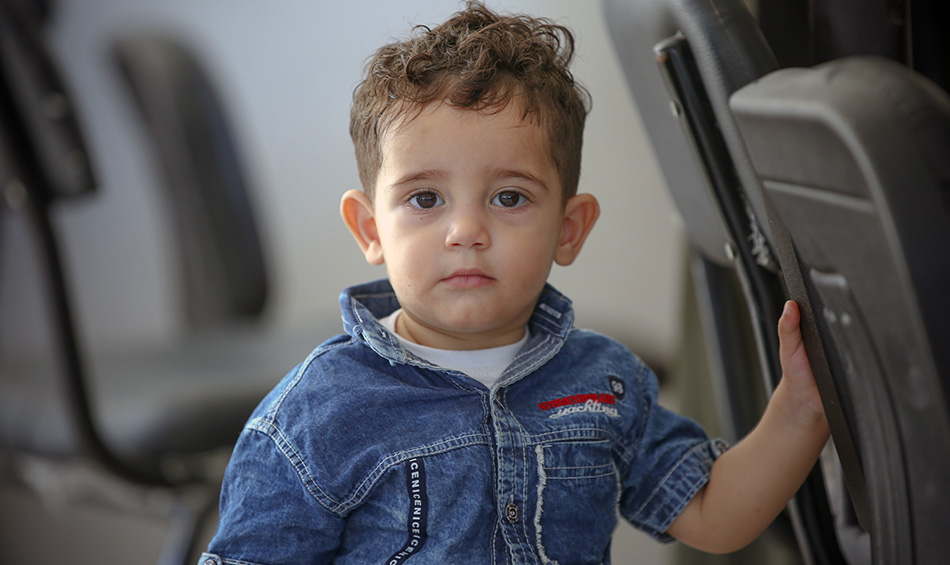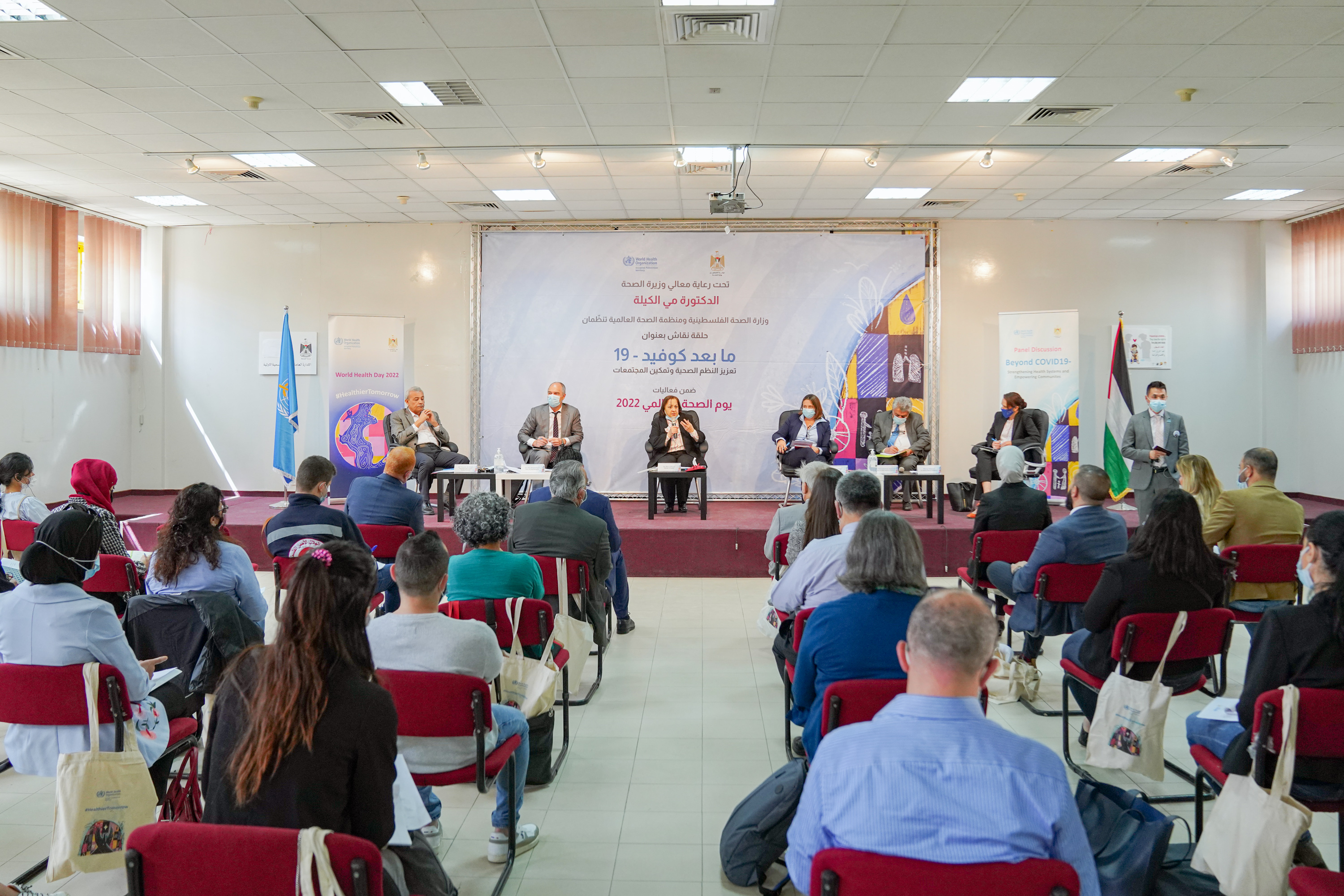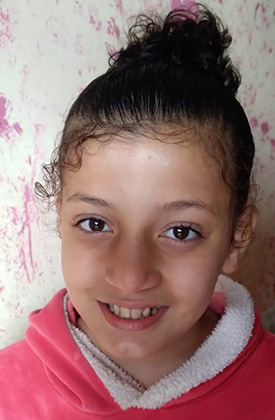EIB and WHO partner to strengthen primary healthcare and oncology services in Palestine as part of a global joint initiative

16 May 2022 - On Sunday, European Investment Bank (EIB) President Hoyer attended the opening ceremony of the new EIB Representation for the West Bank and Gaza. During the event, World Health Organization (WHO) Representative for the occupied Palestinian territory Dr. Richard Peeperkorn and EIB Vice-President Gelsomina Vigliotti confirmed the successful ongoing implementation of the first two technical assistance assignments conducted under the global EIB-WHO partnership for health. The EIB is supporting the WHO to assist the Ministry of Health in assessing and reshaping the national primary healthcare and oncology services strategies. The support will lead to improved prioritisation and increased investment in health in Palestine.
“The EIB and the WHO are committed to strengthening health investments that improve public health in the West Bank and Gaza,” said EIB Vice-President Gelsomina Vigliotti. “The EIB contribution will help the WHO and local authorities to better plan and unlock investments for the welfare of the Palestinian people, such as primary healthcare and oncology services. The two projects we confirm today are an example of the joint commitment to deliver on our global partnership for health, complementing each other’s strengths.”
“The EIB-supported joint Ministry of Health and WHO assessments are strategic and will help to update essential health packages and health financing strategy, improve governance of oncology services, and guide the much-needed increased investment in health in Palestine,” said Dr Peeperkorn.
Background information
On 1 May 2020, the European Investment Bank and the World Health Organization signed their first Memorandum of Understanding, outlining common focus areas including increased collaboration on primary healthcare and health system resilience. The occupied Palestinian territory is the first pilot area where cooperation has been initiated between the two organisations.
The EIB and the WHO, in close cooperation with the European Commission, work together under a global partnership aimed at mobilising investment to support countries in closing the health funding gap and building resilient health systems based on a solid foundation of primary healthcare, to help them reach their health-related Sustainable Development Goals.
The shared goals of the partnership are being achieved by applying a country-led and country-driven approach, identifying gaps in national health systems, designing strategies for interventions and their corresponding investment plans, investing in health system projects and programmes, convening capital providers, supporting implementation and monitoring impact.
Press contacts
EIB
Richard Willis
tel.: +352 4379 82155
Eva De Francesco
tel.: +352 4379 86637
Website: www.eib.org/press
Media Office: +352 4379 21000
WHO
Bisma Akbar
WHO occupied Palestinian territory Communications Officer
+972 54-717-8959
Palestinian Ministry of Health launches polio vaccination campaign to boost immunity in Bethlehem and Jerusalem

13 May 2022 – Ramallah - On Monday 16 May, the Palestinian Ministry of Health will launch round one of a polio vaccination campaign targeting all children under age five in Bethlehem and Jerusalem.
The vaccination campaign is scheduled to run over three days: Monday 16 May through Wednesday 18 May 2022. Vaccination, using bivalent oral polio vaccine (bOPV), is free and will be offered at maternal and child centres and UNRWA centres throughout Bethlehem and Jerusalem.
Palestine has been polio-free for more than 25 years, thanks to a robust routine immunization programme and a strong culture of vaccine acceptance. But following the detection of circulating vaccine-derived poliovirus type 3 (cVDPV3) in sewage outflow in Wadi Alnar site, where there is a junction between wastewater coming from inside the green line with wastewater coming from Bethlehem and Jerusalem, the Ministry of Health has taken the decision to launch a preventative vaccination campaign to boost children’s immunity in the two areas deemed most at risk: Bethlehem and Jerusalem.
“It is all of our duty to keep Palestine polio-free by making sure that our children under the age of five receive the polio vaccine every time it is offered. I encourage every parent to make it a priority to vaccinate their children – for their sake, and for Palestine,” said Dr Mai al-Kaila, Minister of Health, Palestine.
The vaccination campaign is being carried out with support from WHO, UNICEF and UNRWA’s Palestine country offices.
“WHO’s Palestine office has provided technical support to the Ministry in planning and executing this campaign, drawing on the extensive expertise of our regional polio eradication programme. Palestine is in a strong position thanks to its routine immunization programme and to the value Palestinian parents put on childhood immunizations, but the regional risk of polio is increasing and it is absolutely crucial that we reach and vaccinate every child under age five in the target areas,” said WHO occupied Palestinian territory Representative Dr Rik Peeperkorn.
“It is critical that every child can access their right to a life free from polio and other vaccine-preventable diseases. UNICEF and its partners in this campaign are making every effort to ensure no child in Palestine will be affected by this debilitating disease. It is a duty upon all of us to keep Palestine polio free,” said UNICEF’s Special Representative to the State of Palestine Lucia Elmi.
Round two of the campaign will take place in June and will offer all children under age five a second two drops of polio vaccine, further boosting their immunity. Children living outside of Jerusalem and Bethlehem do not currently require an additional dose of oral polio vaccine. If their routine immunizations are up to date, they are well protected from poliovirus and other vaccine-preventable diseases.
Poliovirus primarily affects children under age five and can lead to lifelong paralysis. It can easily be prevented through vaccination. Parents are urged to accept polio vaccines every time they are offered.
The vaccination campaign in Palestine is part of the global effort to eradicate poliovirus, spearheaded by the Global Polio Eradication Initiative.
Media contacts
Damian Rance
UNICEF Palestine Chief of Communication and Advocacy (English)
+972547787604
Mira Nasser
UNICEF Palestine Communications Specialist (Arabic)
+972 598568428
Bisma Akbar
WHO occupied Palestinian territory Communications Officer
+972 54-717-8959
World Health Day 2022 – Strengthening Health Systems and Empowering Communities

7 April 2022, Ramallah - On this World Health Day, we call for a world that supports the health of humans and the environment alike. It is impossible to have a healthy society in a polluted environment, or to have a clean environment in an unhealthy society.
Protection of the environment is critical to the realization of Health For All.
Determinants of human and environmental health require the efforts and support of all sectors, towards achieving Health In All Policies. The COVID-19 pandemic confirmed the impact on and response needed by many other sectors than just Health, it also painfully exacerbated inequities and highlighted the different vulnerabilities to public health risks all over the world including in Palestine. Building stronger and fairer health systems and empowering communities to have control over their health and the health of their environment is essential to creating a world where clean air and water, and safe and nutritious food, is available to all.
“In Palestine, COVID-19 created additional obstacles to realizing comprehensive, quality and affordable health care for all. Our frontline health workers showed resilience and steadfastness, but also faced risks and difficulties in their work. Since the outbreak of COVID-19 in Palestine, more than 9000 health care workers have been affected by the virus. We sincerely thank our brave colleagues for their continued efforts and the care they provide to our communities,” said Dr Mai al-Kaila, Palestinian Minister of Health.
Strengthening health care services and health systems preparedness is needed for the effective detection of and response to future public health emergencies. The climate crisis poses a major threat to human health that demands urgent action across all sectors of society.
“COVID-19 has underlined the need for cross-sectoral engagement to improving population health and addressing the determinants of health inequities. The right to health for all depends on maintaining and improving essential health care, for which expanded domestic and international commitment and investment is vital. Immediate support is needed to address the critical situation jeopardizing sustained provision of referral services to Palestinian patients,” said Dr Richard Peeperkorn, Representative for WHO in the occupied Palestinian territory.
The protracted protection crisis in the occupied Palestinian territory contributes to climate vulnerabilities and fragmentation of health care provision and restricted access to services for patients and their companions.
“Palestinian patients face substantial barriers to accessing essential health care. In March, 35% of permit applications from the Gaza Strip were not approved in time by the Israeli Occupation Authorities’ for patients to reach their hospital appointments. Delaying medical care costs lives and affects the health and wellbeing of Palestinian patients and their families,” said Dr Mai al-Kaila
Zaina, 10, unable to access cancer treatment since February
 15 February 2022 - Zaina is a 10-year-old girl from the Gaza Strip, who was diagnosed with Hodgkin’s lymphoma in June 2020.
15 February 2022 - Zaina is a 10-year-old girl from the Gaza Strip, who was diagnosed with Hodgkin’s lymphoma in June 2020.
After her initial diagnosis, Zaina received chemotherapy at Rantisi Hospital in the Gaza Strip. It was a difficult time for Zaina and her family.
“Zaina suffered with pain and with side effects from the chemotherapy,” her father commented. “When she lost her hair, she kept asking me to buy her wigs. We bought several, but she didn’t like them, she kept saying that her hair is better. Every time I took her out with me, she would ask for a new one – she has at least twenty! It was very tough for us as a family and for my wife especially. She used to ask what we had done to deserve this. Luckily our families were really supportive.” Zaina is the oldest of five children and her family lives in Gaza City, where her mother works as to keep the family home and her father works in a mobile phone store.
Zaina completed the course of chemotherapy in November 2020, after showing early improvements. However, during her follow up in December, doctors found that the tumour was still there. She needed a special type of scan called a PET scan, to assess the activity of the tumour, and decide the next steps for treatment – including potential radiotherapy. Neither the scan nor radiotherapy is available in the Gaza Strip, so Zaina was referred to Augusta Victoria Hospital (AVH) in East Jerusalem for an appointment in February 2021.
From February to October 2021, Zaina’s family submitted four applications for appointments for her to receive investigations and treatment at AVH. None was approved in time for her appointments.
|
Appointments |
Referral hospital |
Israeli permit response |
|
7 February 2021 |
Augusta Victoria Hospital |
Delayed: under study |
|
28 February 2021 |
Augusta Victoria Hospital |
Delayed: under study |
|
19 April 2021 |
Augusta Victoria Hospital |
Application not submitted |
|
3 October 2021 |
Augusta Victoria Hospital |
Delayed: under study |
|
31 October 2021 |
Augusta Victoria Hospital |
Delayed: under study |








